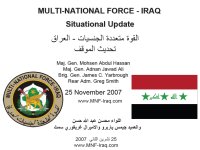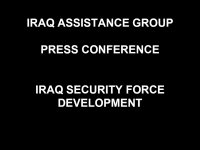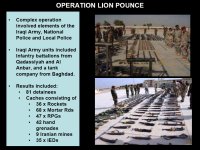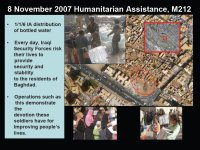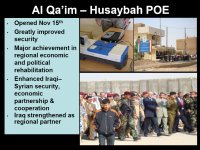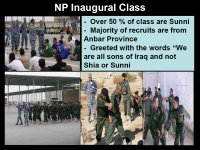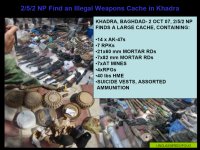
Press Conference: Rear Adm. Smith, Iraqi leaders discuss Iraqi Security Forces' Progress, Nov. 25, 2007
Multi-National Force-Iraq
PRESS CONFERENCE:
Rear Admiral Gregory Smith, Director of Communications, Deputy Spokesman, MultiNational Corps - Iraq
Brigadier General James C. Yarbrough, Commander, Iraqi Assistance Group
Major General Mohsen Abdul Hassan, Director General of Border Enforcement, Iraq Ministry of Interior
Major General Adnan Jawad Ali, Deputy Commanding General, Iraqi Ground Force Command
DATE: November 25, 2007
TRANSCRIBED BY: SOS INTERNATIONAL, LTD.
PARTICIPANTS:
Rear Admiral Greg Smith
Brigadier General James Yarbrough
Major General Mohsen Abdul Hassan
Major General Adnan Jawad Ali
REPORTERS:
Gina Chon from The Wall Street Journal
Jonathan Blakely from National Public Radio
REPORTERS 1-15
*REP1 = REPORTER 1
*INT = INTERPRETER
RDML SMITH: Good afternoon and as-Salāmu `Alaykum. We are pleased to have with us today two senior commanders of the Iraqi Security Forces, Maj. Gen. Adnan, Deputy Commanding General, Iraqi Ground Force Command, and Maj. Gen. Mohsen, the Director General of Border Enforcement within the Ministry of Interior. Accompanying them is Brigadier General James Yarbrough, the commander of the Iraqi Assistance Group, which is tasked with assisting Iraqis as they train and transition their security forces. Beginning with General Yarbrough, the panel will address the increasing effectiveness of the Iraqi security forces, improved border security, and the impact that this is having in stabilizing the security situation across Iraq. Following their remarks, we’ll be happy to take your questions. General Yarbrough.
BRIG GEN YARBROUGH: Good afternoon. As-Salāmu `Alaykum. I’m pleased to join you today to discuss the progress of Iraq’s security forces, specifically Iraq’s Army, the Department of Border Enforcement, and the national police. I’ll share with you my observations over the past five months in working closely with the transition teams and the embedded Iraqi units that they advise, assist, and develop. I’m pleased to be joined by my close friends and counterparts, Major General Adnan, Deputy Commanding General of Iraqi Ground Forces Command, and Major General Mohsen, Director General of the Border Enforcement Department within the Ministry of Interior. Although General Hussein, commander of the national police, is not with us today, I’ll be glad to take questions about the national police. I believe it’s fair to say that the recent success we’ve been experiencing in Iraq is a function of progress in three significant areas. First, coalition and Iraq security forces have had real successes in their fight to reduce or eliminate terrorists, criminals, and insurgents. Second, as the Iraqi people see the security situation improving, it sparks hope for the future. There is promise that they can achieve a stable, secure, and prosperous lifestyle—a hope that’s been suppressed for many years. Third, and the topic we’ll focus on today, there’s been significant growth and increased effectiveness within Iraq’s security forces. New units have been formed, equipped, and trained, and very quickly find themselves operating effectively side-by-side with coalition forces—bravely defeating extremists, criminals, and protecting the Iraqi people. These factors have combined to produce solid momentum and unity against criminal acts and bloodshed and a renewed commitment to work toward a better life in Iraq. We have a tremendous opportunity to capitalize on this increased stability and also exploit this momentum if we can achieve politically and economically what’s been achieved in the area of security. Progress has not been easy.
Innumerable challenges remain. But each day we see continued improvements. This is a long journey, but we’re moving forward step-by-step with Iraq. I’ll show you some day-to-day examples now of some significant successes in recent operations if we could put the first slide up. This slide shows the 8th Iraqi Army’s operation last week, Operation Line Pounce in Diwianiyah; a great example of how Iraq’s security forces are capable of complex operations with little to no coalition support. This is a joint operation involving the Iraqi Army, national police, and Iraqi police. The intent of the operation was to clear Diwianiyah of insurgent activity. It was a landmark operation in that Army forces from al Anbar’s 7th Iraqi Army Division, an Iraqi tank company from Baghdad, the 9th Army Division, and an entire brigade of Minister of Interior Forces, the 5th Brigade of the 2nd National Police Division deployed, and in two days were all commanded for a complex operation by General Uthman, Commanding General of the 8th Iraqi Army. After three days of checkpoint operations, aggressive patrolling, and cordon and search operations, these forces detained 81 insurgents, seized 35 rockets, 124 mortar rounds, many mortar systems, rocket-propelled grenades, and 12 anti-armor grenades. Slide 2 shows Iraqi Army soldiers aren’t just conducting combat operations. Here we see 1st Battalion, 1st Brigade of the 6th Iraqi Army delivering much needed humanitarian supplies to mulhalla 212 on the 8th of November. Iraq’s security forces have recently earned a level of confidence from the Iraqi citizens not seen in the past. The next slide, slide 3, shows the successful opening of the al Qa’im Port of Entry to Syria at Husaybah on the 15th of November. This opening was symbolic of the progress across all fronts: Security, governance, and economic growth. Two years ago, al Qa’im was the wild, wild west. The government had lost control of about 200 kilometers of its border. Al-Qaida had taken it over, had free passage back and forth to Syria, was killing Iraqi citizens, and attacked coalition and Iraqi forces. Now Iraqi Army, police, and coalition forces, assisted by local citizens, have joined the Department of Border Enforcement to secure the area, invest in a state-of-the-art port of entry with technology that includes biometrics, radar scanners, and passport scanners to prevent smuggling and contraband or weapons, and provide a major stimulus to the local and national economy. This has improved relations with Syria and raised Iraq’s status as a regional partner. I’ll wrap up with two slides about the national police. This slide shows that national police is addressing the allegations of sectarian bias through a recruiting campaign that’s resulted in a mixed Sunni and Shi’a class of 1,900 recruits who began training on the 13th of November. Their intent is to distribute these recruits to all of the national police units. And finally, slide 5, the national police displays both the capability and the willingness to act independently and improve security. This slide shows the national police exploiting a very large weapons cache found in Khadra after acting on a tip from a local citizen. I’ll now welcome General Ali— correction—Major General Adnan who is the Deputy Commanding General of Iraqi Ground Forces Command for their comments.
MAJ GEN ADNAN: Speaks in Arabic.
INT: My name is Staff Major General Ali. I would like to give you a brief about the Iraqi Ground Forces Command. We created this IGFC on the 15th May 2005. In 2006, June, we started our operations. And let me tell you that our operations center was very developed and capable of doing operations in all Iraq. Coalition forces were very successful in helping us on creating this headquarters. IGFC consists of the following: 11 infantry divisions and one mechanized division consist of three mechanized brigades and one armored brigade. The intention is to form one more division to complete 13 divisions. We need this Army to be for all Iraqis. Through their work and through their competence, as General Yarbrough said, all the operations we have in our area of command as in the province of Diwianiyah and the Army forces and the police have very great role and the citizens, concerned citizens, have a great role in preventing the insurgent attacks. Same thing happened in the province of Diyala. I believe this year has very good news for citizens because we saw a lot of citizens returned to their area, specifically displaced families that got fired away from their areas. And through these combined operations, we saw big success in the region. And right now, we have high-tech equipment and the goal of this good equipment is to show big success from north to south. I thank you very much.
MAJ GEN MOHSEN: Speaking in Arabic.
INT: With the name of God, I would thank all the news present here with us. It’s a big chance for us to show the development we have in the borders. Let’s start with a brief history about this department. After the liberation in 2003, all Department of Borders were dissolved, including the POEs and all the guard posts within the borders. And we start about thinking of creating again this border. We created it again on 2004 August. I don’t want to go through details of this, I just want to give you a brief about what we have right now. And Department of Borders right now is about five areas. The first one is—the first area is in Kurdistan. And the second one is in Ninawa, Al-Anbar and (unintelligible), the eastern side of the country. And the third is in Wasit and Diyala. And the fourth is Al-Basrah and Misan. And the fifth is between Najaf and (unintelligible). Right now is a headquarter for Department of Border Enforcement we have in control all the POEs of Iraq, including the Kurdistan POEs. And in addition to these POEs, we have custom police belong to us. Until 2006, we had 176 control posts, and this force covered all the borders, which is 3,631 kilometers. And right now, we have, including the ports and until now we have 585 control posts in the borders and let me give you a brief how this happened. As far as personnel in DBE, officers 1,800 over that. 80% of them were exofficers, 20% of them are new. And as far as workers, we have over 2,000, and before we had 1,000. And let’s go to the POEs, Port of Entry, we have ten active POE. And these POEs they have communication between them. For example, POE Zurbatiya has communication with other POEs as the one in Walid. And right now we have high-tech equipment in these POEs. I’ll tell you this equipment, we harvested lot of good results out of it and prevented a lot of bad guys to come in and prevented lot of forged documents to be used by bad guys. And we have a lot of cases that captured with the joint operation. We captured over 36 that were forging their papers and trying to go through the borders. Right now, going through the borders with a forged paper is very hard, and it’s almost impossible. I’ll tell you the borders between Iraq and all the neighboring countries are much secure than before. I wouldn’t say 100% but probably close. In many aspects—aspect of feeding the troops, as far as high-tech equipment, as far as forces to secure the borders, but we still have issues including we don’t have equipment that cover remote areas in the desert. And right now we’ve—I’ll give you example of areas. North end of [unintelligible], 90 kilometer north of Qa’im. We have another area that we’re facing issues. For example the area—the triangle of Iraq-Syria-Jordan, the roads are not very good. Let me talk about another subject, which is the activities in the POEs. If we see how many citizens we are receiving right now from the borders—the borders coming from Syria, Jordan, other countries—we are receiving tremendous numbers of displaced families and refugees coming back to Iraq. For example, in Syria and Jordan, we have a lot of issues dealing with these big numbers. And for the vehicles passing through the POEs, before five days the number of POVs trying to pass through the borders from Syria to Iraq is unbelievable. Huge line were waiting in the POE to come in Iraq. And if that explains something, it explains the security improvement in the country. And I will talk about another thing in the POEs, which is creating wells so the workers and POEs they can use these wells and we created even water purification stations, local water purification stations, and we’re trying for remote forces we have out there to give them a selfsufficiency in take care of themselves and their own. And thank you very much.
RDML SMITH: We’re prepared to take your questions. Please. Yes, sir.
REP1: Asks question in Arabic.
INT: My name is Ayadnar Budhi from the News. This question is for General Mohsen. You said that you arrested 63 forged papers. Who—what percentage is Arabs? What countries they came from?
MAJ GEN MOHSEN: Speaks in Arabic.
INT: Let me tell you in 2005-2006 the one we capture, we have a lot of them were from Arabic nationalities. The number we arrested, 63, it was no Arab between them.
RDML SMITH: Yes, sir. Please.
REP2: Asks question in Arabic.
INT: Mohammed Ali. This question for General Mohsen. Concerning the smugglers coming from Syria to Iraq, American forces they are saying that these smugglers they are trying to get in illegally to Iraq. How are these weapons are coming to Iraq? For example, the Iranian weapons. If you have good control on the borders, how can you secure this area?
MAJ GEN MOHSEN: Speaks in Arabic.
INT: My friend, every country in the world cannot secure their borders at 100%. If you don’t have any cooperation from the neighboring countries, their neighboring countries, they cannot tell them. In 2006 we had a lot of smugglers. What I said about securing the borders I meant 100%, but we still have work ahead to secure it at 100%. Through the numbers I explained that the ports we have to secure the borders before we have missed numbers. Before we had about 20 kilometers between port—observation port and the other one. But we’re trying to shorten it. You know, 20 kilometers, it’s a big area to see. Right now, let me tell you that we still working ahead, there’s a lot of working that needs to be done to secure it 100%. If you compare it with 2006 and 2005, it’s a big drop on the numbers of smugglers and I have the numbers with me. It gives you from 2005, for example, August all the way to this year. Currently, I don’t have it with me but I can get you details of it. But this is a result of the political decision that made by the government and the opening we had and the good relationship we started in the right way with our neighboring countries. Right now, we’re harvesting the results of this political process. Of course, we still have smugglers but they are limited.
RDML SMITH: Yes, sir.
REP3: Asks question in Arabic.
INT: General Mohsen question. Concerning al Qa’im, Qa’im is open between Iraq and Syria. Can you tell me why?
MAJ GEN MOHSEN: Speaks in Arabic.
INT: There is one port that General Yarbrough spoke about. Al Qa’im in 2003, 2004, and 2005, it was destroyed, definitely. We did not have any water well, we did not have any observation tower and, as you know, al Qa’im POE created—it was 1997. And it was shut down in 2003. And al-Qaida and criminals and bad guys destroyed this port. And it was an area uncontrolled. And the area is about 210 kilometers and the whole total of it is 210. We did not have any observation port or anything. It was a big theater for smugglers. After the help of coalition forces and the Marines we have out there and, as you know, we have some forces—back then they were staying in tents. After we controlled the area at 100%, in 2006, September, we decided to build it and we started building 2007, February. This POE is very developed as far as equipment and the buildings we have. Even the workers who work in this POE are very professional. Concerning the Syrian port, as you know the Syrians, they promised us that through the next probably year they would do their best to improve their side of it and to make it one of the main POEs. I believe in the next week, we’re going to start working together. Thank you.
RDML SMITH: Second row here first. Then we’ll come back in the corner.
REP4: Hi. I’m Gina Chon, Wall Street Journal. This question is for both General Yarbrough and General Mohsen. From both your perspectives, if you could tell us about the situation on the Iranian border, especially since Iran said that it would try to stop the flow of both people and support and munitions into Iraq. And also, if you have any statistics on the traffic that you see going back in forth in terms of both vehicle and foot traffic and the percentage of items you may have found that were suspect. If you have any numbers on that, that would be great, too.
BRIG GEN YARBROUGH: Sure, I’ll take the first stab at that and I’ll leave the statistics to General Mohsen who has more than I do. But I will tell you, we are welcoming Iran’s declaration that they want to stop the fighting in Iraq. The traffic across the border is serious. We know that they’re committed. I think we’re going to take a wait-and-see approach right now to see if we can measure that they have indeed reduced the amount weapons and foreign trafficking across the border and the training that they’re doing in Iran. But there are a variety of conditions that are affecting the security of Iraq right now. The effectiveness of the Army, the effectiveness of the border forces and national police, the will of the people and, of course, the will of Iran to stop the fighting helps. But right now, I think it’s a little too early to say that we can gauge and measure a direct impact from their commitment. We welcome it. A sustained, substantial commitment will certainly help.
MAJ GEN MOHSEN: Speaks in Arabic.
INT: As far as accountability, I don’t really have it with me or statistics. I have the numbers who’s coming. But I have to mention one thing. Not everyone who’s coming in is a terrorist. Not everyone who’s passing the borders is terrorist. And we have a lot of a percentage of them, they are pilgrims, they are coming for visiting here. For example, if I go back into July, the smugglers we had up north in July we have 30. That belongs to first region, the [unintelligible] area. Third region, which is in Wasid, we had about one smuggler, an Iranian, and three smugglers, Iraqis, were captured by the Iranian side. Fourth region, we didn’t have nobody in that time. But every Monday numbers are different. But the start of right now, what’s going on? The question is, do we have improvement or not? Smugglers this month is diminished to numbers very close to zero and this because of strengthening the borders and adding a lot of forces in the borders, but there is always some breach and the region of [unintelligible] as you know is very solid area, mountainous area. And we have a hard time to build roads or towers—or observation towers, and right now we did the five; despite all this we built five and we have programs to build more. And as you know, al Anwar region is full of waters and we have a hard time to build borders—to build towers on there. Thank you.
REP5: Asks question in Arabic.
INT: My question in for General Yarbrough. As you know, Baghdad—we had a few incidents with VBIEDs in Baghdad. Coalition forces accused militias. When you accused these militias, did you base your accusation on evidences or through these militias belong to alQaida and they are the one who named this operations? Thank you.
RDML SMITH: I believe the interpreter said for General Yarbrough, but I believe the question was to myself. Yesterday we announced that there were four Iranian-backed special group members that were detained as a result of the pet market bombing in Baghdad on Friday. That detention came about by way of intelligence that was produced that identified these four individuals. Subsequent to that, they confessed to being part of a special group cell that was responsible for the bombing. They named the senior special group member that was in charge, and we’re pursuing that individual as we speak. The individual components used in the bomb material was also identified as belonging to a kind of components used in the past by their special groups. So that was a collective sense of the information that we have and are working with today to identify the source of this particular event that occurred on Friday.
REP5: Asks question in Arabic.
RDML SMITH: Interpretation, please
INT: Sir, you didn’t mention to whom they belong.
RDML SMITH: We’ve yet to announce that. That’s correct. We’re still working from an intelligence point of view. When we’re prepared to do that, we’ll make that announcement.
UNKNOWN: Speaks in Arabic.
RDML SMITH: Next question, please. In front here, please.
REP7: Asks question in Arabic.
INT: [unintelligible] I have many questions for Generals. Major General—General, don’t you think what’s happening in Diwianiyah right now just is because of political issue? Don’t you think what’s happening right now? Why you didn’t bring back all the Iraqi forces and officers for FPS, for example. Why don’t you bring these FPS back to MOD or MOI? Why? Before as Iraqi channels they always picture and give pictures for the terrorists. Why don’t you do it anymore? And did you make any decision concerning about the hiring process that they are taking some money as bribe to—for—in order for them to hire?
MAJ GEN ADNAN: Thank you very much for your question. I’m going to answer the military portion of it. What’s happening right now in Diwianiyah is Operation [unintelligible]. This operation is a joint operation between Iraqi Army and national police and local police. And this operation is very professional. It doesn’t have anything to do with militias or anything. But the goal of it is to fight these militias and bring back security to the area. And these militias they disturb security in Diwianiyah. That’s why we captured a few suspects and operation is to get rid of all the militias and all the bad guys in Diwianiyah. And in parallel to this we have another operation in Diyala and the goal of this is to get rid of al-Qaida bad guys in there. Concerning the question about did you brought back all the old, ex-Iraqi army officers? My answer is, as you know, there is Iraqi newspaper asking—the Prime Minister is asking all the ex-Iraqi officers to come back with the help of the MOD and Iraqi Ground Forces Command. We opened the chance—it will give a chance for all officers to come back to the Army, but there is one thing. When we call back these officers, specifically officers when we have an opening for 1,000 position, what we receive is only 200. What we now have is we opened the door for all officers to come back. Until yesterday, we are studying all the lists of exofficers we had before and we had some decisions made concerning the long ex-officers, the longer hardcore Ba’athists so we have a remark about this. Concerning recruiting centers, we have CID in charge, and they do a lot of follow up, and watching these recruiting centers and trying to defeat this bribery that is going on at these recruiting center and we’re trying to clean it up. And Minister of Defense is doing his best through his investigations. We had some officers transferred to Justice Department, or brought to Justice Department. That’s what happening right now concerning your questions. Did I miss any other questions?
REP7: Asks question in Arabic.
INT: It was a question about national police. Are they trained well to defend this country?
MAJ GEN ADNAN: To be honest, the training that the Iraqi Army reached right now, the Iraqi Army are very professional in their job and their goal is to defend this country and defend its stability. And as you know, these displaced families, they are coming back right now, and you know well the reason is because the Iraqi Army brought back the security to these areas and called back these displaced families to come back.
RDML SMITH: We have another question here, ma’am.
REP8: Sorry.
RDML SMITH: Back here, please. Yes, sir.
REP9: Asks question in Arabic.
INT: If I could ask for something about the borders.
MAJ GEN MOHSEN: Speaks in Arabic.
INT: I had some remarks about training and volunteering. As I said, 80% of my officers I have right now, they are from the exArmy. We have three different training centers. We have one in Basrah, [unintelligible], and one in [unintelligible]. In 2004, 2005, 2006, we were training forces. And right now we have in my DBE 6,000 non-training. Let me tell you why. First of all, national police, their size grown up very quickly and their role is more important than DBE as far as bringing security to citizens. And Minister of Interior decided that the priority would be for national police. And I agreed in these decisions. I give up some training centers to national police and my troops I figured that I could train them in POEs or in DBE centers. When it comes to training officers, we have some rotations that goes from rank to rank. I have some other foreign training [unintelligible] that go outside and we have specialized training, too, for DBE specialized training. Volunteering, for example, if there is any corruption in the volunteering and recruiting. What’s happening right now in Ministry of Interior, we have committees. These committees they go to their area and these committee based on their physical fitness and their education and they hire them fairly. And there is some cases, few cases. I know that you spoke about FPS issue, too. I know it’s not my specialty but I belong to Ministry of Interior. That’s why I am able to answer. As you know, FPS, they just—they protect buildings, they protect facilities. And right now, they still have them. In Ministry of Interior, they have even a director inside MOI that belongs to FPS. I believe they found about 10,000—between 7,000 and 10,000 names that actually did not exist and they were getting paid. So right now, FPS is working very good and thank you very much.
REP10: Speaks in Arabic.
RDML SMITH: … and then we’ll come back here. Go ahead, please.
REP11: Asks question in Arabic.
INT: My question is for General [sic] Smith. Is there a plan to give high-tech weapon or American weapon to borders? And how do you evaluate Iraqi forces in your side? Thank you.
RDML SMITH: I believe your question was whether or not the Iraqi government is purchasing or intends to purchase high-tech weaponry. I’m not certain what you mean by high-tech or weaponry. They certainly have been advancing technologies in terms of scanning equipment and other equipment that’s used on border control points and border control entry areas. Is that what you’re referring to?
REP11: Asks question in Arabic.
INT: What I meant is American weapons, including M-4 or better weapons than what al-Qaida is using. Does America have a plan or coalition forces have a plan to give these weapons to Iraqi forces?
RDML SMITH: Well, let me ask my colleague, General Yarbrough, to answer that question. He’s clearly the support element for the Iraqi security forces.
REP11: Asks question in Arabic.
INT: My second question—my second question is how do you evaluate—how coalition forces evaluate the DBE and border forces? Thank you.
RDML SMITH: Again, thank you for the question. I think General Yarbrough is in the best position to answer both those questions. General Yarbrough.
BRIG GEN YARBROUGH: I will tell you right now we do not have a request from the Government of Iraq to put different weapons in the hands of the Department of Border Enforcement. We have 50,000 M-16s and M-4s that we’re fielding to the Iraqi Army. I would say that the more important technology and equipment for the borders should be exactly what we’re providing as we did in al-Qa’im and we’re providing them for every port of entry. The technology that will allow us to scan passports and check them against bad lists that contain criminals and terrorists and insurgents. The technology to use radar scanners to look in the back of cargo bins of trucks with illicit cargo and contraband and weapons. The technology to have biometrics, finger-print data, and iris-scanning capability, and also the Iraqi biometrics system, IAFIS is the acronym. I think if you put all of those together with increased cooperation for your bordering countries, that you should not be shooting on your borders, but you should be interdicting contraband and terrorists by technical means.
RDML SMITH: Yes, sir. I think right here in the second row.
REP12: I am Bryan from AFP. General Mohsen, you mentioned that you’re catching very few smugglers at the moment. Does this mean that weapons aren’t coming across the borders any more? Or just that you’re not catching them, they’re more clever than you? Secondly, General Adnan, could you put on record the total number of forces at the moment—the Iraqi police and the military? And maybe, Admiral Smith, you could tell us the—you mentioned the large numbers of people coming back. The UN yesterday appeared to indicate that it’s too early for people to return from other countries. Could you comment on that?
MAJ GEN MOHSEN: Speaks in Arabic.
INT1: Could you please repeat the question for me? It’s not really clear.
INT2: I believe something about smugglers.
REP12: …asking—you said you’re catching very few smugglers. Does this mean that there aren’t any and weapons aren’t coming across any more?
MAJ GEN MOHSEN: Speaks in Arabic.
INT: Smuggling, you know, it never ends. Smuggling, we have it before, we have it in the old regime and it’s all over the world. But all over the world we have this smuggling. Right now if you ask me, if you ask me if you improved the forces in the borders or to vary your question, did we find weapons? Did we find any weapons smugglers? That’s what you meant maybe. Yes, definitely. Yes. We capture a lot of smugglers and their material. We send it to Justice Department. All we do is just very brief investigation. And I hope that my answer is clear.
REP13: This is off to the General—[continues in Arabic].
MAJ GEN ADNAN: Speaks in Arabic.
INT: Concerning the number of soldiers we have right now in IGFC, we have 160,000—around 160,000—and we have…in addition to this we have a lot of battalions are created; new recruits are waiting for training on different levels from company all the ways to divisions. Right now, we have five operations centers and we’re thinking about opening other operation in Anbar and Ninawa. And all these operation centers need new recruits, new soldiers. And our Army needs to improve, needs to grow bigger so they can control all the area. Concerning national police, I cannot answer this. I cannot really answer all these detailed questions about the numbers we have in national police…
BRIG GEN YARBROUGH: I would like to make a comment on the national police but first, a tack-on to the observation of the growth of the Iraqi Army. I think our standpoint, it’s fairly remarkable the amount of growth in just the past 12 months. They’ve added two division headquarters, eight brigade headquarters, and 27 battalions. That’s a total of 43,000 new soldiers in just a 12-month period. And all the while, they’ve been fighting a determined enemy. As we see those new units fielded and then occupy battlespace side-by-side with our coalition brigades and battalions, they are quite effective, quite early. Now, we have a long way to go, and we’re going to stay with them to continue to advise and assist them as they get better equipment, improve their logistical capability, and continue to grow where the Prime Minister and the Minister of Defense say they need to be stationed. A quick comment on the national police since I spend quite a lot of time with them, we were with General Mohsen and General Odierno last night with a supper and all of his commanders in the room. And the coalition commanders reflected on what a great amount of progress they have made in the past 12 months. I spend a lot of time with them. I think they have very solid potential. They know that they have a sectarian bias in their history. General Hussein, when he walks around and talks to his commanders, he makes the observation that we have two enemies. We have terrorists and our own reputation. And he’s taking great measures to eliminate both. He has, by his own admission, eliminated probably 19 out or 24 battalion commanders in the past year that were not performing well. And he’s eliminated all nine out of nine brigade commanders. So leadership, courage, and time and training are the elements that will bring them to a very effective fighting force and a paramilitary law enforcement force as well. They are very effective. As I look in my time here, every single hard task that’s gone their way, they’ve achieved. They’ve deployed brigade-sized units to Samarra, to Basrah. Just now, they put a brigade on short notice down to Diwianiyah. They are putting those 1,900 Sunni recruits across all of their force. They have put all their brigades through the first level of training where they pull them out and send them to Numaniyah for 30 days. They are now generating the next level of proficiency by sending battalions to the NATOsponsored training mission by the Italian Carabinieri, and that’s seven intensive weeks of collective training. So I think they’ve got the right leadership, they’ve got the courage to confront their flaws, and I think they show great promise.
RDML SMITH: And regarding your last question on the issue of refugees and other IDPs, yesterday it was announced that the Special Representative of the United Nations’ Secretary-General for Iraq, Mr. Mistura, met with the Iraqi Minister of Displacement and Migration, Abdul Samid Sultan, again yesterday. The two discussed United Nations assistance to the current flow of returning refugees and internallydisplaced people. Secretary Mistura commented on the improved security conditions in many areas of Iraq, and has pledged the United Nations’ full commitment to assist the government of Iraq in putting in place measures to ensure that those who return voluntarily can do so safely and with the appropriate material and legal support. And the first step that the United Nations will make in that regard is the United Nations High Commission for Refugees is making preparations to provide up to 5,000 Iraqi families with both material assistance, including blankets, kitchen equipment, and other household items to help reintegrate those individuals into their communities. So I think the UN has clearly recognized that there are returning refugees. The numbers, as General Mohsen has mentioned, is significant. The numbers of individuals returning back to neighborhoods here in Baghdad has been noticeable, and the UN is taking steps to support the Government of Iraq in that effort. And I think we have time for one more question. Yes, sir.
REP14: Thanks. Jonathan Blakely from National Public Radio. I’m wondering if you can talk a little bit about what those refugees are encountering. We already know that some of them are coming back and finding people are in their houses. What type of problems are they encountering and how are you dealing with them?
RDML SMITH: I think I’ll turn to General Adnan for this.
MAJ GEN ADNAN: Speaks in Arabic.
INT: Concerning refugees who have very detailed follow-up on their return. Iraqi Ground Forces Command, we have a committee in coordination with Baghdad operations and in order for us to make the safe return to their houses. As you know, there is a lot of damage to their houses, but not all of them. The regions that we have stable security as Wasaliyah region, Lavamiyah, Karadah region, Lavamiyah. Few of these refugees they have damaged houses and I believe as Ground Forces leadership, we give all the help and support to take them back to their houses. But as far as replacing their damages, it’s on the government. Thank you.
RDML SMITH: Go ahead. We’ll take one last question and then we’ll call it in. Right here, please.
REP15: Asks question in Arabic.
INT: After concerned citizen and operation of citizens in the regions and the support of coalition forces to their CLC, we saw improvement in Anbar and in Baghdad, Sa`adiyah. From same people who are working up there, these young people, they received some uniforms and weapons, and coalition forces and the Iraqi Army are supporting these guys. Are you going to hire them as military in the future or you just leave them this way?
MAJ GEN ADNAN: Speaks in Arabic.
INT: Concerning these concerned citizens, you know the goal is to bring back security to the region. And as you know, these guys they brought a lot of information against al-Qaida, and this intel helped on bringing back security. And we have a committee of Diyala, we have meetings on a weekly basis and we talk about these concerned citizens. And the plan is we need to get rosters of these soldiers or concerned citizens, and we need to do a background check on these concerned citizens. And if they didn’t participate in any criminal acts against Iraqis or security forces and we make a decision on hiring them as police or Iraqi Army. And the lists we have right now, about 3,433. And we ask Diyala committee to verify these names and to create recruiting center to hire them as Army. That’s, again, is for Army. And some other areas actually they want the benefits of these citizens. Thank you very much.
RDML SMITH: Shukran. And again, thank you for joining us today. I appreciate it. Sorry for the delay but it was important that we had all our guests available today. Appreciate it. We’ll have also an opportunity to sit down with General Odierno and General Abud on Wednesday, and I look forward to you all being here. Bye-bye.
|
NEWSLETTER
|
| Join the GlobalSecurity.org mailing list |
|
|
|


